人教版八年级下册英语Unit知识点
人教版八年级英语下册Unit-1--Unit-3-单元知识点归纳
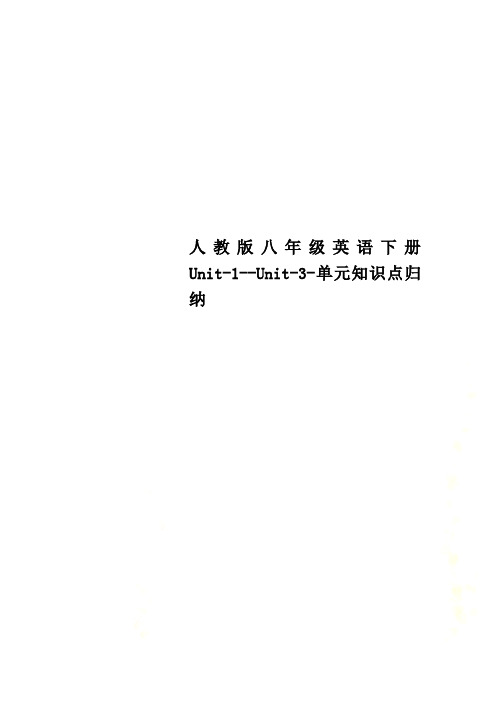
人教版八年级英语下册Unit-1--Unit-3-单元知识点归纳free【动词】使……解脱,得到自由He could not free his arm.free from21. run out用完,用尽 When his water run out, he knew that he would have to do something to save his own life.物sth. tun out. 某物用尽了。
人sb. run out of物sth..人用尽了某物。
He run out of all his money last night.22.risk sth to do sth. 冒着...的风险去做某事 take a risk=take risks 冒险risk doing ...=take the risk of doing ...23. the importance of (doing) sth.(做)某事的重要性 We students should know the importance of (learning) English.importance n. 重要(性), important adj.重要的,unimportant adj.24.decision 【名词】决定;抉择; make a decision to do sth.decide25. be in the control of …掌管,管理 The headmaster is in the control of this new school. be out of control无法控制,无法管理 be under control被控制住,在控制之中26. 【复习】mind意为介意,Would you mind my opening the window?27. give up (doing) sth. 放弃(做)某事,give up (playing) computer games;give up后可接名词、代词和动词ing形式,也可不接,如 Never give up easily.II. 重点短语1. have a fever 发烧2. have a cough 咳嗽3. have a toothache 牙疼4. talk too much 说得太多5. drink enough water 喝足够的水6. have a cold 受凉;感冒7. have a stomachache 胃疼8. have a sore back 背疼9. have a sore throat 喉咙痛10. lie down and rest 躺下来休息11. hot tea w ith honey 加蜂蜜的热茶12. see a dentist 看牙医13. get an X-ray 拍X 光片14. take one’ s temperature量体温15. put some medicine on sth. 在……上面敷药16. feel very hot 感到很热17. sound like 听起来像18. all weekend 整个周末19. in the same way 以同样的方式20. go to a doctor 看医生21. go along 沿着……走22. on the side of the road 在马路边23. shout for help 大声呼救24. without thinking twice 没有多想25. get off 下车26. have a heart problem 有心脏病27. to one’ s surprise使....... 惊讶的28. thanks to 多亏了;由于29. in time 及时30. save a/one’s life挽救生命lose one's life 31. get into trouble 造成麻烦32. right away 立刻;马上33. because of 由于34. get out of 离开;从……出萍35. hurt oneself 受伤36. put a bandage on sth. 用绷带包扎37. fa ll down 摔倒38. feel sick 感到恶心39. have a nosebleed 流鼻血40. cut his knee 割伤他的膝盖41. put her head back 把她的头向后仰42. have problems breathing 呼吸困难43. mountain climbing 登山运动44. be used to doing sth. 习惯做某事45. run out (of) 用完;用尽46. so that 以便47. so. . . that 如此… …以至于…48. be in control of 掌管;管理49. in a difficult situation 在闲境屮50. keep on doing sth. 继续或坚持做某事51. make a decision 做出决定52. take risks 冒险53. give up 放弃III. 重点语法【反身代词】英语中共有八个反身代词,在使用时应注意和它所指的相应的对象在人称、性别、数上保持一致。
最全面人教版八年级下册英语第一单元知识点归纳总结

Unit 1 What's the matter?一、词汇与短语◆重点单词A部分1.matter n. 问题;事情2.sore adj. 疼痛的;酸痛的3.stomachache n. 胃痛;腹痛4.foot n. 脚;足5.neck n. 颈;脖子6.stomach n. 胃;腹部7.throat n. 咽喉;喉咙8.hurt v. (使)疼痛;受伤9.fever n. 发烧10.passenger n. 乘客;旅客11.lie v. 躺;平躺12.break n. 间歇;休息13.rest v. &n. 放松;休息14.onto prep. 向;朝15.X-ray n. X射线;X光16.trouble n. 问题;苦恼17.toothache n. 牙痛18.hit n. (用手或器具)击;打19.headache n. 头痛20.herself pron. (she的反身代词)她自己21.off adv. & prep. 离开(某处);不工作;从……去掉B部分1.bandage n. 绷带v. 用绷带包扎2.press v. 压;挤;按3.sick adj. 生病的;有病的4.knee n. 膝;膝盖5.breathe v. 呼吸6.knife n. 刀7.sunburned adj. 晒伤的8.blood n. 血9.ourselves pron. (we反身代词)我们自己10.mean v. 意思是;打算11.climber n. 登山者;攀登者12.importance n. 重要性;重要13.risk n.&v. 危险;风险;冒险14.decision n. 决定;抉择15.accident n.(交通)事故;意外遭遇16.control v.&n. 限制;约束;管理17.situation n. 情况;状况18.spirit n. 勇气;意志19.kilo( = kilogram) n. 千克;公斤20.death n. 死;死亡21.rock n. 岩石22.nurse n. 护士◆重点短语A部分1.have a cold 感冒2.lie down 躺下3.have a stomachache 胃痛4.take one's temperature 量体温5.have a fever 发烧6.to one's surprise 使……惊讶的是7.get off 下车8.right away 立即;马上9.take breaks (take a break) 休息10.talk too much 说得太多11.drink enough water 喝足够的水12.have a very sore throat 嗓子非常疼13.get an X-ray 拍X光片14.see a dentist 看牙医15.drink some hot tea with honey 喝一些加蜂蜜的热茶16.put some medicine on sth.在……上面敷一些药17.feel very hot 感到很热18.sound like 听起来像19.all weekend 整个周末20.in the same way 以同样的方式21.go to a doctor 看医生22.go along 沿着……走23.on the side of the road 在马路边24.shout for help 大声呼救25.without thinking twice 没有多想26.have a heart problem 有心脏病27.thanks to 多亏了;由于28.in time 及时29.save a life 挽救生命30.get into trouble 陷入麻烦31.hurt oneself 受伤32.fall down落下;摔倒B部分1.be used to 习惯于……;适应于……2.in a difficult situation 在困境中3.take risks (take a risk) 冒险4.keep on doing sth. 继续(或坚持)做某事5.run out (of) 用尽;耗尽6.make a decision 作出决定7.cut off 切除8.get hit on the head 撞到头部9.get out of 离开;从……岀来10.be interested in 对……感兴趣11.give up 放弃12.mean doing sth. 意味着做某事13.put a bandage on sth. 用绷带包扎…14.lose one's life 失去生命15.feel sick 感到恶心16.mountain climbing 登山运动17.have problems breathing 呼吸困难18.be in control of 掌管;管理◆重点句子A部分1.What's the matter with you?=What's the trouble with you?=What's wrong with you?你怎么了?2.What should she do? 她该怎么办呢?3.Did you fall down? 你跌倒了吗?4.Should I take my temperature? 我应该量一下体温吗?5.I think I sat in the same way for too long without moving.我想我以同样的姿势一动不动地坐得太久了。
人教版英语八年级下册Unit 1-5 单元语法知识梳理
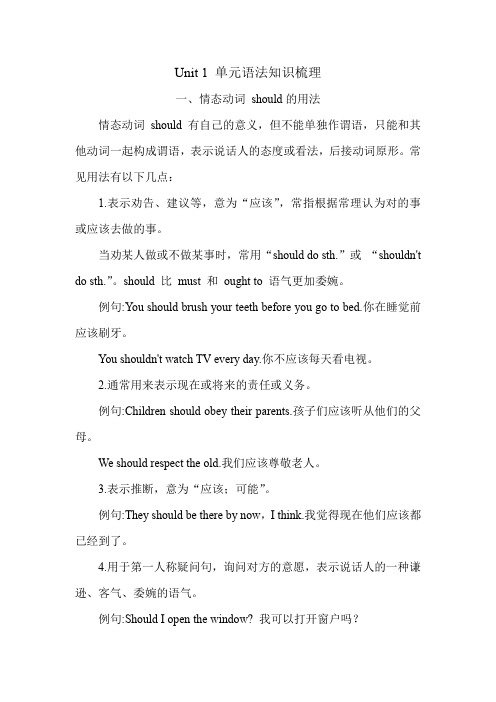
Unit 1 单元语法知识梳理一、情态动词should的用法情态动词should有自己的意义,但不能单独作谓语,只能和其他动词一起构成谓语,表示说话人的态度或看法,后接动词原形。
常见用法有以下几点:1.表示劝告、建议等,意为“应该”,常指根据常理认为对的事或应该去做的事。
当劝某人做或不做某事时,常用“should do sth.”或“shouldn't do sth.”。
should 比must 和ought to 语气更加委婉。
例句:You should brush your teeth before you go to bed.你在睡觉前应该刷牙。
You shouldn't watch TV every day.你不应该每天看电视。
2.通常用来表示现在或将来的责任或义务。
例句:Children should obey their parents.孩子们应该听从他们的父母。
We should respect the old.我们应该尊敬老人。
3.表示推断,意为“应该;可能”。
例句:They should be there by now,I think.我觉得现在他们应该都已经到了。
4.用于第一人称疑问句,询问对方的意愿,表示说话人的一种谦逊、客气、委婉的语气。
例句:Should I open the window? 我可以打开窗户吗?What should we do now? 我们现在该干什么呢?5.表示某种感情色彩,意为“竟会”,常用于以how, why开头引导的特殊疑问句中。
例句:Why should you be so early today? 你今天为什么会如此早?二、反身代词1.反身代词的构成反身代词是一种表示反射或强调的代词。
它由第一人称、第二人称的形容词性物主代词和第三人称代词的宾格加词尾-self或-selves构成。
其构成如下表:反身代词与它所指代的名词或代词形成互指关系,两者在人称和数上应保持一致。
初中英语人教版八年级下册重点语法详解( Unit 1-6)

八年级英语下册重点语法详解Unit 1Irene Irene中英文天地 2023-03-16 12:19 发表于广东1.have / get / catch a(n)+疾病名称,表示患某种疾病。
e.g.I have / get / catch a cold.我感冒了。
【拓展】have a bad cold 重感冒have a fever 发烧have a headache 头痛have a stomachache 肚子痛, 胃痛have a toothache 牙痛have a backache 背痛2.lie down 躺下e.g.You had better lie down and have a rest.你最好躺下休息。
3.have a rest = take a rest = rest 休息have a break=have breaks=take a break=take breaks (课间)休息4.away from 离开……;与……有一定的距离(与不同动词搭配,意思会受上下文影响)e.g.They live away from us.他们住的地方离我们远。
5.see sb.doing sth.看见某人正在做某事e.g.When I pass the window I see him drawing a picture.当我经过窗户时,看到他正在画画。
see sb.do sth.看见某人做过某事e.g.I often see him draw pictures.我经常看到他在画画。
6.think twice 认真思考,权衡利弊e.g.We must think twice before we make this decision.我们在做决定之前应该权衡利弊。
7.to one’s surprise 使……惊讶的是,出乎……意料e.g.To their surprise, all the students pass the exam.令他们惊讶的是,所有学生都通过考试了。
八年级下册英语知识点最全归纳

八年级下册英语知识点最全归纳Unit 1 短语及句型1.many\\much---- more + 可数或不可数名词更多few --- fewer + 可数名词更多little ----- less +不可数名词更少例如:more people、more pollution、less free time、less pollution、fewer cars、fewer trees2.there will be 将会有 There will be more people.将会有更多的人Will there be less pollution?会有更少的污染吗?Yes,there will.\\ No,there won’t.是,会有。
\\ 不,不会有。
3.be free 免费的4. on computers 在电脑上 on paper 在纸上5.live to be 活到 live to be 200 years old 活到200岁6.fall in love with sb.\\sth. 喜爱某人或某物7.live alone 单独居住8.on vacation 度假9.over and over again 一遍又一遍10.be the same as 与…一样be different from 与…不同unit 2 单词及短语1.What should I \\he\\she\\they\\you do? 我\\他\\她\\他们\\你该怎么办? You could write him a letter. 你可以给他写一封信。
2.argued with sb. 与某人争吵3.out of style 过时的 in style 时尚的4.a ticket to a ball game 一场球赛的票5.surprise sb. 使某人惊奇be surprised at sth. 对…感到惊奇to one’s surprise 令某人惊奇的事6.pay for 支付7.ask sb. for sth. 向某人要求某物ask sb. to do sth. 要求某人做某事8.have a bake sale 烧烤9.find out 发现,查明10.get on well with sb. 与某人相处得好11.have a fight with sb. 与某人争吵、打架12.not……until 直到…才13.it’s time for sth.\\it’s time to do sth. 做某事的时间到了14.under too much pressure 承受太多的压力15.take part in 参加,参与16.a mother of three 三个孩子的妈妈Unit 3 短语及句型1.What were you doing when the UFO arrived?当UFO到达时你在干什么?2.While the boy was walking down the street, the UFO landed. 当男孩在沿着街道走时,UFO降落了3.in front of 在…之前(外部整体前)in the front of (内部整体前)4.talk on the phone 在电话中交谈nd on the street 在街上降落6.walk down the street 沿着街道走7.take off (过去式 took off) 起飞8.around ten o’clock 大约10点9.You can imagine how strange it was!你可以想象它有多奇怪!10.Museum of Flight 飞行博物馆11.jump down 跳下来12.in a tree 在树上 on a tree 长在树上13.run away 跑开,逃跑14.say to sb. 对某人说15.one of the most important events 最重要的事件之一 (one of + 形容词最高级+名词复数)最…之一16.in silence 无声的17.take place 发生(预先安排) happen 发生 (偶然)18.have meaning to sb. 对…来说有意义Unit 4 短语及句型1.He said he was hard-working. 他说他努力学习了2.She said she was having a party for Lana她说她为Lana举行了聚会3.mad at sb. 对某人生气4.first of all 首先5.pass sth. to sb. \\ pass on sth. 传递某物6.be sppoused to 应该7.I’m better at reading than listening. 我的阅读比听力好。
人教版英语八年级下册unit1单元知识点归纳总结
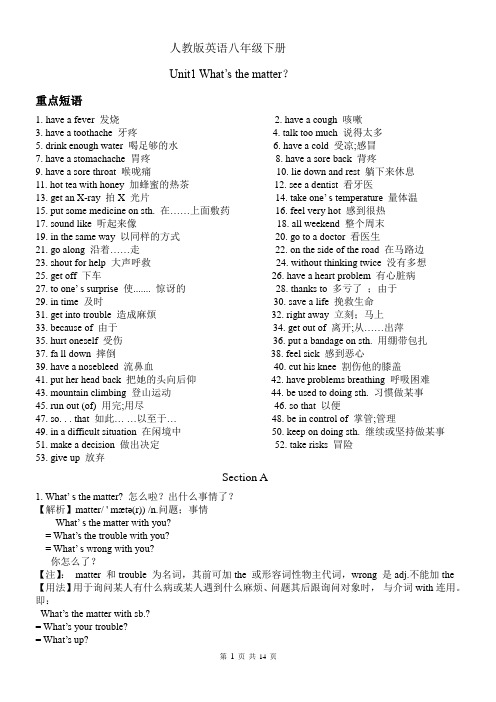
人教版英语八年级下册Unit1 What’s the matter?重点短语1.have a fever 发烧2. have a cough 咳嗽3. have a toothache 牙疼4. talk too much 说得太多5. drink enough water 喝足够的水6. have a cold 受凉;感冒7. have a stomachache 胃疼8. have a sore back 背疼9. have a sore throat 喉咙痛10. lie down and rest 躺下来休息11. hot tea with honey 加蜂蜜的热茶12. see a dentist 看牙医13. get an X-ray 拍X 光片14. take one’ s temperature 量体温15. put some medicine on sth. 在……上面敷药16. feel very hot 感到很热17. sound like 听起来像18. all weekend 整个周末19. in the same way 以同样的方式20. go to a doctor 看医生21. go along 沿着……走22. on the side of the road 在马路边23. shout for help 大声呼救24. without thinking twice 没有多想25. get off 下车26. have a heart problem 有心脏病27. to one’ s surprise 使....... 惊讶的28. thanks to 多亏了;由于29. in time 及时30. save a life 挽救生命31. get into trouble 造成麻烦32. right away 立刻;马上33. because of 由于34. get out of 离开;从……出萍35. hurt oneself 受伤36. put a bandage on sth. 用绷带包扎37. fa ll down 摔倒38. feel sick 感到恶心39. have a nosebleed 流鼻血40. cut his knee 割伤他的膝盖41. put her head back 把她的头向后仰42. have problems breathing 呼吸困难43. mountain climbing 登山运动44. be used to doing sth. 习惯做某事45. run out (of) 用完;用尽46. so that 以便47. so. . . that 如此… …以至于…48. be in control of 掌管;管理49. in a difficult situation 在闲境中50. keep on doing sth. 继续或坚持做某事51. make a decision 做出决定52. take risks 冒险53. give up 放弃Section A1. What’ s the matter? 怎么啦?出什么事情了?【解析】matter/ ' mætə(r)) /n.问题;事情What’ s the matter with you?= What’s the trouble with you?= What’ s wrong with you?你怎么了?【注】:matter 和trouble 为名词,其前可加the 或形容词性物主代词,wrong 是adj.不能加the 【用法】用于询问某人有什么病或某人遇到什么麻烦、问题其后跟询问对象时,与介词with连用。
八年级下册人教版英语第一单元2b知识点
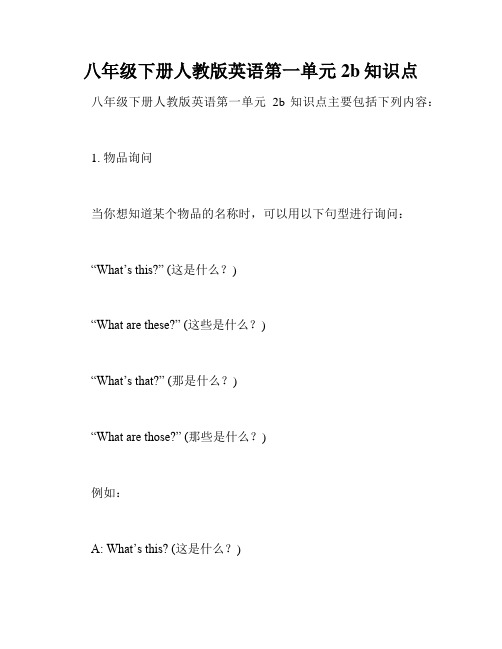
八年级下册人教版英语第一单元2b知识点八年级下册人教版英语第一单元2b知识点主要包括下列内容:1. 物品询问当你想知道某个物品的名称时,可以用以下句型进行询问:“What’s this?” (这是什么?)“What are these?” (这些是什么?)“What’s that?” (那是什么?)“What are those?” (那些是什么?)例如:A: What’s this? (这是什么?)B: It’s a book. (这是一本书。
)2. 物品描述当你要描述某个物品时,可以用以下句型进行描述:“It’s + 物品名称” (它是……)“They are + 物品名称” (它们是……)例如:A: What’s that? (那是什么?)B: It’s a computer. (那是一台电脑。
)3. 物品位置当你想询问某个物品的位置时,可以用以下句型进行询问:“Where is + 物品名称?” (……在哪儿?)例如:A: Where is the pencil sharpener? (铅笔刀在哪儿?)B: It’s on the desk. (它在桌子上。
)4. 物品所有者当你想询问某个物品的所有者时,可以用以下句型进行询问:“Whose + 物品名称?” (……是谁的?)例如:A: Whose ruler is this? (这是谁的尺子?)B: It’s Lily’s. (它是莉莉的。
)这些知识点可以在日常生活中轻松应用,帮助你更快地了解和适应英语环境。
在学习英语过程中,要注重口语和听力的训练,加强交流能力,提高语言应用能力。
Unit1what’sthematter_SectionA知识点梳理人教版八年级英语下册

人教版八年级下册英语课本知识点梳理Unit 1 wh at’s the matter? sectionA课文内容:What's the matter? 怎么了? (教材第1页)【用法详解】What's the matter? 怎么了?/出什么事了?常用于询问某人患了何种疾病,遇到了什么困难等,也可用于询问某物出了什么故障,其后可接with sb./sth.,表示“某人/某物怎么了?”。
其中matter 用作名词,意为“问题;事情”matter前须加定冠词the。
【例句】What's the matter? 怎么了?Bad luck.I lost my pen. 真倒霉,我弄丢了钢笔.What's the matter with him? 他怎么了?He has a sore back.他背痛【拓展】matter[动词] 要紧;有关系多用在否定句、疑问句或条件句中It doesn't matter.没关系。
(通常用来回答对方的道歉)I have a cold. 我感冒了。
(教材第1页)【用法详解】have a cold (患)感冒。
其中have 用作及物动词,意为“患(病);遭受(病痛)”,常用于结构“have a/an +疾病名称”表示患病或身体某部位不舒服。
此时它不能用于进行时态,其第三人称单数形式为has,过去式为had。
常见的表示病痛的短语还有:have a fever 发烧have a toothache 牙疼have a headache头痛have a cough 咳嗽have a stomachache胃痛Do you often have a cold? 你经常感冒吗?Jim had a stomachache after supper yesterday.吉姆昨天晚饭后胃痛。
l have a stomachache.我胃痛。
( 教材第1 页)【用法详解】stomachache [名词]胃痛;腹痛是由“名词stomach(;腹部)+ache(疼痛)”构成的复合名词。
(完整版)Unit1人教版八年级英语下册语法与知识点,推荐文档

Unit 1第一部分:Grammar一、情态动词(Modal Verbs)情态动词should 意为“应该,应当”,必须和后面的动词原形一起构成谓语,没有人称和数的变化。
用以表达职责和义务、提出劝告,而且表述的是自己的主观看法。
注意:should 在以why,who,how 等疑问词开头的问句中,意为“竟然,居然,怎么会”,表示意外、惊喜或在说话人看来是不可思议的。
三、反身代词表示反射或强调的代词叫做反身代词。
反身代词是由第一人称、第二人称形容词性物主代词或第三人称代词的宾格形式,词尾加self 或selves 组成。
反身代词可译“本人”、“本身”,为加强语气,也常翻译为“亲自”、“自己”。
不定人称代词one ---- o neself.第二部分:单词用法Section A1.What’s the matter?怎么了?该句常用询问某人患了何种疾病或遇到了什么麻烦,其后用with 引出对象。
1). What’s the matter with sb.?=what’s wrong with sb.?=what’s the trouble/problem with sb.?=what’s one’s trouble/problem?e.g. What’s the matter w ith Tom?=what’s with Tom?=What’s the with Tom?=What’s Tom’s?2). matter, 名词,“问题,事情”e.g. We have important (matter) to discuss.我们有些重要的问题要讨论。
3). 动词,“要紧,关系重大”e.g. It dosen’t that you came late.2.I have a cold. 我感冒了。
1).have/get/catch a cold “感冒,着凉”The old man a cold yesterday.那位老人昨天感冒了。
Unit1词汇,短语,语法归纳人教版八年级英语下册

八下 unit 1 语法归纳总结询问某人的健康问题及遇到事情麻烦等常用的表达方式1 What's the matter (with xx)?(某人)怎么了?2 What's wrong (with xx)?(某人)怎么了?3 What's the trouble (with xx)?(某人)怎么了?4 What happened (to xx)?(某人)发生了什么事?5 Are you OK? 你没事吧?6 Is there anything wrong with xx? 某人有什么事吗?练一练: What's the matter with your leg? ﹦________ ________ ________ ________ __________?﹦________ ________ ________ ________ __________?表达身体疼痛或不舒服,可用如下结构1. sb + have/ has + 病症Eg: Sb has/ have a cold/ bad cold/ cough/ fever/ temperature/ nosebleed某人有感冒,重感冒,咳嗽,发烧,出鼻血2.sb + has/have + a + 身体部位 + acheEg: Sb has/have a headache / toothache/ earache/ backache/ heartache/ stomachache 某人头痛,牙痛,耳朵疼,后背痛,心痛,胃痛3. sb + has/ have + a sore +发病部位Eg: Sb has/have a sore throat/ eye/ back/ arm某人嗓子疼,眼睛疼,后背疼,胳膊疼4. sb + has/have a pain (pains) in one's + 身体部位Eg:Sb has/have a pain in sb's head/ neck 某人头痛,脖子痛5. sb的某部位 + hurt(hurts)注:hurt的过去式,过去分词还是hurteg: My head hurts. 我头痛 His legs hurts。
(完整版)人教版八年级英语下册Unit1知识点讲解(可编辑修改word版)

Unit 1 重点知识讲解Grammar一、情态动词(Modal Verbs)情态动词should 意为“应该,应当”,必须和后面的动词原形一起构成谓语,没有人称和数的变化。
用以表达职责和义务、提出劝告,而且表述的是自己的主观看法。
1.should 的句式结构2.s hould 的用法喜或在说话人看来是不可思议的。
二、其他表示建议的句型表示反射或强调的代词叫做反身代词。
反身代词是由第一人称、第二人称形容词性物主代词或第三人称代词的宾格形式,词尾加self 或selves 组成。
反身代词可译“本人”、“本身”,为加强语气,也常翻译为“亲自”、“自己”。
不定人称代词one ---- oneself.1、反身代词的分类2、反身代词的用法单词的用法Section A1.What’s the matter?怎么了?该句常用询问某人患了何种疾病或遇到了什么麻烦,其后用with 引出对象。
1). What’s the matter with sb.?=what’s wrong with sb.?=what’s the trouble/problem with sb.?=what’s one’s trouble/problem?e.g. What’s the matter with Tom?=what’s with Tom?=What’s the with Tom?=What’s Tom’s?2). matter, 名词,“问题,事情”e.g. We have important (matter) to discuss.我们有些重要的问题要讨论。
3). 动词,“要紧,关系重大”e.g. It dosen’t that you came late.2.I have a cold.我感冒了。
1).have/get/catch a cold “感冒,着凉”The old man a cold yesterday.那位老人昨天感冒了。
人教版英语八年级下册第一单元Unit 1知识点
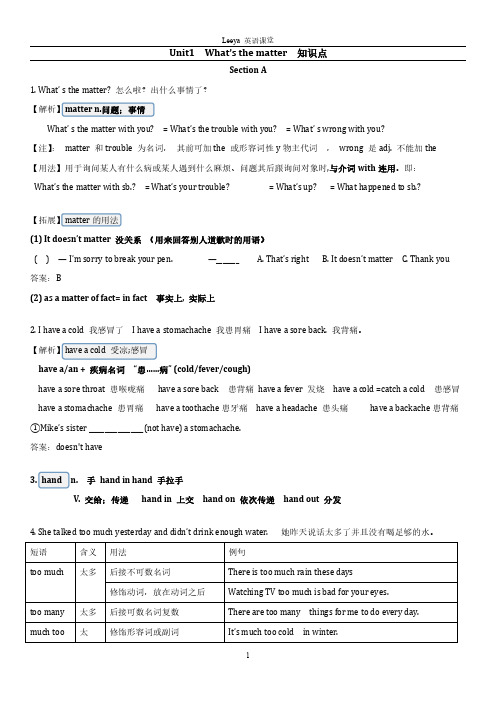
Unit1What’s the matter知识点Section A1.What’s the matter?怎么啦?出什么事情了?【解析】matter n.问题;事情What’s the matter with you?=What’s the trouble with you?=What’s wrong with you?【注】:matter和trouble为名词,其前可加the或形容词性y物主代词,wrong是adj.不能加the【用法】用于询问某人有什么病或某人遇到什么麻烦、问题其后跟询问对象时,与介词with连用。
即:What’s the matter with sb.?=What’s your trouble?=What’s up?=What happened to sb.?【拓展】matter的用法(1)It doesn’t matter没关系(用来回答别人道歉时的用语)()—I’m sorry to break your pen.—_______ A.That’s right B.It doesn’t matter C.Thank you 答案:B(2)as a matter of fact=in fact事实上,实际上2.I have a cold我感冒了I have a stomachache我患胃痛I have a sore back.我背痛。
【解析】have a cold受凉;感冒have a/an+疾病名词“患……病”(cold/fever/cough)have a sore throat患喉咙痛have a sore back患背痛have a fever发烧have a cold=catch a cold患感冒have a stomachache患胃痛have a toothache患牙痛have a headache患头痛have a backache患背痛①Mike’s sister_________________(not have)a stomachache.答案:doesn't have3.hand n.手hand in hand手拉手V.交给;传递hand in上交hand on依次传递hand out分发4.She talked too much yesterday and didn’t drink enough water.她昨天说话太多了并且没有喝足够的水。
八年级下册人教版英语第一单元3a知识点

八年级下册人教版英语第一单元3a知识点在八年级下册人教版英语第一单元3a的学习中,我们需要掌握以下几个知识点:1. 一般现在时态一般现在时态表示经常发生的动作,习惯或者事实。
它的构成是:主语+动词原形(第三人称单数加s)。
例如:He usually goes to school by bus.(他通常乘公交车上学。
)2. 一般过去时态一般过去时态表示过去某个时间发生的动作或者事件。
它的构成是:主语+动词过去式。
例如:I watched TV last night.(我昨晚看电视了。
)3. 句子的基本结构英语句子的基本结构是:主语+谓语+宾语。
其中,主语通常是表示动作的人或物;谓语是说明主语动作或者状态的动词;宾语是接受动作的人或物。
例如:She eats an apple.(她吃了一个苹果。
)4. 形容词和副词的用法形容词用来描述名词或代词的特征或状态,放在名词或代词之前。
例如:The tall boy is my brother.(那个高个子的男孩是我弟弟。
)副词用来描述动词、形容词或其他副词的状态或特征,放在所修饰词的后面。
例如:She sings well.(她唱歌唱得很好。
)5. 物主代词的用法物主代词用来代替名词或代词所表示的人或物的所有格,分为形容词性物主代词和名词性物主代词。
形容词性物主代词用来修饰名词,放在名词之前;名词性物主代词则直接代替名词。
例如:She is my sister.(她是我的妹妹。
)以上就是八年级下册人教版英语第一单元3a知识点的简要介绍,希望能够对同学们的英语学习有所帮助。
当然,光掌握这些知识点还不够,还需要在实际学习和应用中不断去巩固和提高自己的语言技能。
人教版八年级下册英语第一单元unit1知识点

人教版八年级下册英语第一单元u n i t1知识点(总5页)-本页仅作为预览文档封面,使用时请删除本页-Unit 1 Will people have robots★语法知识归纳一、概念:表示将来某个时间要发生的动作或存在的状态,也表示将来经常或反复发生的动作,常与表示将来的时间状语连用,如tomorrow, next week, next year等。
I will go back to my hometown next week.We will come to see you every Sunday.二、构成1.肯定式:主语+will/shall/be going to +动词原形+其他will:shall:be going to:○They’ll have a test next week.○Shall we have a rest?○I’m going to write a letter to my friend.2.否定式:在will/shall/be后面加notwill+not= shall+not= is+not= are+not=将上面三个肯定句变为否定句○○○3.一般疑问句:将will/shall/be提到主语之前。
将○、○句变为一般疑问句○○★重点句子讲解you think there will be robots in pe ople’s homes?(1)本句是一个_________句,think后面接_________从句,从句的语序必须是_________语序。
引导词_______________________.(2)there will be是there be 句型的一般将来式,否定形式为___________________.一般疑问句形式是 _____________________. be going to 形式为______________________________.翻译:今晚将有一场电影。
人教版八年级下册英语Unit 6单元语法知识点总结

人教版八年级下册英语Unit 6单元语法知识点总结本单元重点短语的具体用法1. watch TV:看电视。
例如:I like to watch TV in the evening.(我喜欢晚上看电视。
)2. read a newspaper:看报纸。
例如:He reads a newspaper every morning.(他每天早上看报纸。
)3. talk on the phone:通过电话交谈。
例如:She is talking on the phone with her friend.(她正在和朋友通电话。
)4. listen to a CD:听CD。
例如:I often listen to a CD to relax.(我经常听CD 来放松。
)5. a useful book:一本有用的书。
例如:This is a very useful book for learning English.(这是一本学习英语非常有用的书。
)6. make soup:做汤。
例如:My mom is making soup in the kitchen.(我妈妈正在厨房做汤。
)7. wash the dishes:洗碟子。
例如:It's your turn to wash the dishes.(轮到你洗碟子了。
)8. go to the movies:去看电影。
例如:Let's go to the movies this weekend.(我们这周末去看电影吧。
)9. at home:在家。
例如:I stayed at home all day yesterday.(我昨天一整天都待在家里。
)10. eat out:在外面吃。
例如:We decided to eat out instead of cooking.(我们决定出去吃而不是做饭。
)11. drink tea:喝茶。
例如:Do you like to drink tea or coffee?(你喜欢喝茶还是咖啡?)12. Dragon Boat Festival:端午节。
新人教版八年级下册英语unit
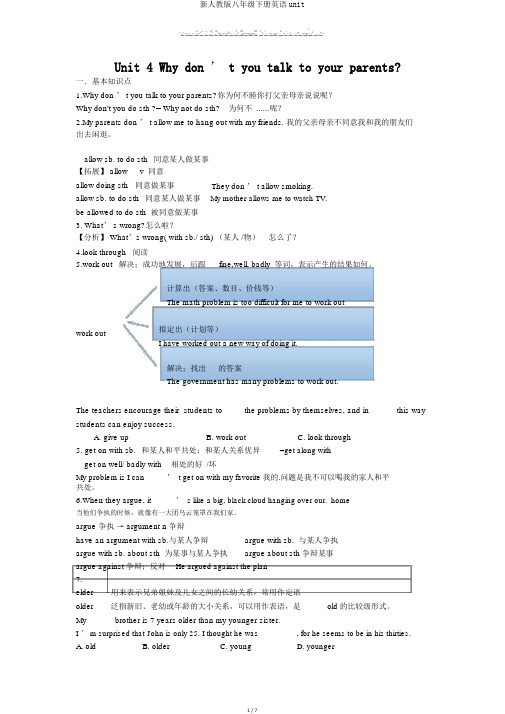
Unit 4 Why don’ t you talk to your parents?一.基本知识点1.Why don ’ t you talk to your parents?你为何不睦你打父亲母亲说说呢?Why don't you do sth ?= Why not do sth?为何不......呢?2.My parents don ’ t allow me to hang out with my friends. 我的父亲母亲不同意我和我的朋友们出去闲逛。
allow sb. to do sth同意某人做某事【拓展】 allow v 同意allow doing sth同意做某事allow sb. to do sth同意某人做某事be allowed to do sth 被同意做某事3. What’ s wrong?怎么啦?They don ’ t allow smoking.My mother allows me to watch TV.【分析】 What’s wrong( with sb./ sth) (某人 /物)怎么了?4.look through阅读5.work out解决;成功地发展,后跟fine,well, badly 等词,表示产生的结果如何。
计算出(答案、数目、价钱等)The math problem is too difficult for me to work outwork out拟定出(计划等)I have worked out a new way of doing it.解决;找出的答案The government has many problems to work out.The teachers encourage their students to ____ the problems by themselves, and instudents can enjoy success.A. give upB. work outC. look through5. get on with sb.和某人和平共处;和某人关系优异=get along withget on well/ badly with相处的好/坏My problem is I can’ t get on with my favorite我的.问题是我不可以喝我的家人和平共处。
人教版八年级下册英语Unit 3单元语法知识点总结

人教版八年级下册英语Unit 3单元语法知识点总结本单元重点短语的具体用法1. do the dishes:洗餐具- I need to do the dishes before going out.(我出门前需要洗餐具。
)2. take out the rubbish:倒垃圾- Can you take out the rubbish, please?(你能倒一下垃圾吗?)3. fold your clothes:叠衣服- Remember to fold your clothes neatly.(记得把你的衣服叠整齐。
)4. sweep the floor:扫地- She sweeps the floor every day.(她每天都扫地。
)5. make your bed:整理床铺- It's your turn to make your bed.(轮到你整理床铺了。
)6. clean the living room:打扫客厅- We need to clean the living room before guests arrive.(在客人到来之前,我们需要打扫客厅。
)7. go out for dinner:出去吃饭- Let's go out for dinner tonight.(我们今晚出去吃饭吧。
)8. go to the movies:去看电影- They like to go to the movies on weekends.(他们喜欢在周末去看电影。
)9. stay out late:在外面待到很晚- Don't stay out late, it's not safe.(别在外面待太晚,不安全。
)10. get a ride:搭车- I'll get a ride with my friend.(我会和我朋友一起搭车。
)11. work on doing sth:从事做某事- He is working on writing a novel.(他正在写一本小说。
人教版八年级下册英语知识点总结
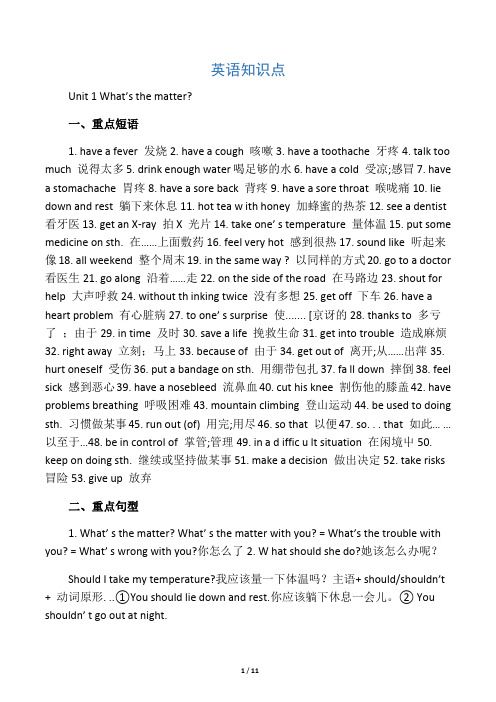
英语知识点Unit 1 What’s the matter?一、重点短语1. have a fever 发烧2. have a cough 咳嗽3. have a toothache 牙疼4. talk too much 说得太多5. drink enough water喝足够的水6. have a cold 受凉;感冒7. have a stomachache 胃疼8. have a sore back 背疼9. have a sore throat 喉咙痛10. lie down and rest 躺下来休息11. hot tea w ith honey 加蜂蜜的热茶12. see a dentist 看牙医13. get an X-ray 拍X 光片14. take one’ s temperature 量体温15. put some medicine on sth. 在……上面敷药16. feel very hot 感到很热17. sound like 听起来像18. all weekend 整个周末19. in the same way ? 以同样的方式20. go to a doctor 看医生21. go along 沿着……走22. on the side of the road 在马路边23. shout for help 大声呼救24. without th inking twice 没有多想25. get off 下车26. have a heart problem 有心脏病27. to one’ s surprise 使....... [京讶的28. thanks to 多亏了;由于29. in time 及时30. save a life 挽救生命31. get into trouble 造成麻烦32. right away 立刻;马上33. because of 由于34. get out of 离开;从……出萍35. hurt oneself 受伤36. put a bandage on sth. 用绷带包扎37. fa ll down 摔倒38. feel sick 感到恶心39. have a nosebleed 流鼻血40. cut his knee 割伤他的膝盖42. have problems breathing 呼吸困难43. mountain climbing 登山运动44. be used to doing sth. 习惯做某事45. run out (of) 用完;用尽46. so that 以便47. so. . . that 如此… …以至于…48. be in control of 掌管;管理49. in a d iffic u lt situation 在闲境屮50. keep on doing sth. 继续或坚持做某事51. make a decision 做出决定52. take risks 冒险53. give up 放弃二、重点句型1. What’ s the matter? What’ s the matter with you? = What’s the trouble with you? = What’ s wrong with you?你怎么了2. W hat should she do?她该怎么办呢?Should I take my temperature?我应该量一下体温吗?主语+ sho uld/shouldn’t + 动词原形. ..①You should lie down and rest.你应该躺下休息一会儿。
人教版英语八年级下册 单词 短语 语法
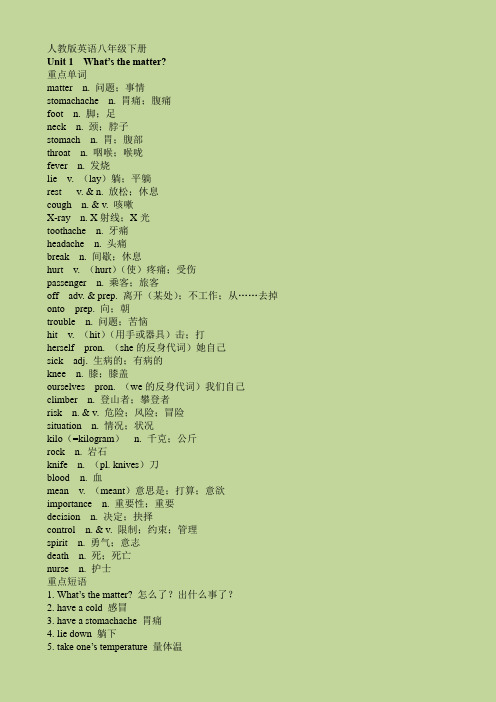
人教版英语八年级下册Unit 1What’s the matter?重点单词matter n. 问题;事情stomachache n. 胃痛;腹痛foot n. 脚;足neck n. 颈;脖子stomach n. 胃;腹部throat n. 咽喉;喉咙fever n. 发烧lie v. (lay)躺;平躺rest v. & n. 放松;休息cough n. & v. 咳嗽X-ray n. X射线;X光toothache n. 牙痛headache n. 头痛break n. 间歇;休息hurt v. (hurt)(使)疼痛;受伤passenger n. 乘客;旅客off adv. & prep. 离开(某处);不工作;从……去掉onto prep. 向;朝trouble n. 问题;苦恼hit v. (hit)(用手或器具)击;打herself pron. (she的反身代词)她自己sick adj. 生病的;有病的knee n. 膝;膝盖ourselves pron. (we的反身代词)我们自己climber n. 登山者;攀登者risk n. & v. 危险;风险;冒险situation n. 情况;状况kilo(=kilogram)n. 千克;公斤rock n. 岩石knife n. (pl. knives)刀blood n. 血mean v. (meant)意思是;打算;意欲importance n. 重要性;重要decision n. 决定;抉择control n. & v. 限制;约束;管理spirit n. 勇气;意志death n. 死;死亡nurse n. 护士重点短语1. What’s the matt er? 怎么了?出什么事了?2. have a cold 感冒3. have a stomachache 胃痛4. lie down 躺下5. take one’s temperature 量体温6. have a fever 发烧7. take breaks(take a break)休息8. get off 下车9. to one’s surprise 使……惊讶的;出乎……意料10. right away 立即;马上11. get into 陷入;参与12. be used to 习惯于……;适应于……13. take risks(take a risk) 冒险14. run out (of) 用尽;耗尽15. cut off 切除16. get out of 离开;从……出来17. be in control of 掌管;管理18. give up 放弃重点句型1. —What’s the matter?—I have a stomachache.2. —W hat’s the matter with Ben?—He hurt himself. He has a sore back.3. —Do you have a fever?—Yes, I do. / No, I don’t./I don’t know.4. —Does he have a toothache?—Yes, he does.5. —What should she do?—She should take her temperature.6. —Should I put some medicine on it?—Yes, you should. / No, you shouldn’t.7. You shouldn’t eat so much next time.He should lie down and rest.He should see a dentist and get X-ray.重点语法1. have在涉及健康问题的句子中的应用。
- 1、下载文档前请自行甄别文档内容的完整性,平台不提供额外的编辑、内容补充、找答案等附加服务。
- 2、"仅部分预览"的文档,不可在线预览部分如存在完整性等问题,可反馈申请退款(可完整预览的文档不适用该条件!)。
- 3、如文档侵犯您的权益,请联系客服反馈,我们会尽快为您处理(人工客服工作时间:9:00-18:30)。
Unit9 Have you ever been to a museum?名词:camera 照相机;摄像机toilet 坐便器;厕所province 省份spring 春天fox 狐狸information 信息;资料invention 发明;发明物amusement 娱乐;游戏ride 供乘骑的游乐设施;短途旅程动词:encourage 鼓励collect 收集;采集形容词:unbelievable 难以置信的;不真实的rapid 迅速的;快速的unusual 特别的;不寻常的social 社会的peaceful 和平的;安宁的perfect 完美的;完全的safe 安全的;无危险的副词:simply 仅仅;只;不过mostly 主要的;通常数词:thousand 一千连词:whether 不管……(还是);或者……(或者);是否whenever 在任何……的时候;无论何时兼类词:progress v&n 进步;进展fear v&n害怕;惧怕Indian adj印度的 n印度人German adj德国的;德语的;德国人的 n德语;德国人Japanese adj日本的;日本人的;日语的 n日本人;日语短语:amusement park 游乐场tea art 茶艺tea set 茶具a couple of 两个;一对;几个thousands of 数以千计的;许许多多的all year round 全年on the one hand……on the other hand……一方面……另一方面……知识点:1、to one's amusement 令某人发笑的是to one's surprise 令某人吃惊的是to one's joy/happiness 令某人高兴的是To Tom's amusement, Lily and Jack are dancing and singing in the car. 令Tom发笑的是,Lily和Jack在车里又唱又跳。
To my surprise, they said okay!令我惊讶的是,他们说可以!To her joy/happiness, all her students passed the exam. 令她高兴的是,她的所有学生都通过了考试。
2、somewhere adv 在某处;到某处go somewhere 去某处adj修饰时放在后面,somewhere different 不同的地方somewhere interesting 有趣的地方go somewhere interesting 去有趣的地方I want to go somewhere interesting. 我想去有趣的地方。
在否定句和疑问句中,表示任何地方用anywhereDo you go anywhere interesting?你去过什么有趣的地方吗?3、 have a great/good/wonderful timehave fun 玩的开心;过得愉快enjoy oneselfWe had a great/good/wonderful time at the party.=We enjoyed ourselves at the party.=We had fun at the party.我们在聚会上玩得很开心。
4、lead to 通向;导致;把……带到All roads lead to Rome. 条条大路通罗马。
Eating too much sugar can lead to health problems. 吃太多的糖会引起健康问题。
5、make progress in sth 在……方面取得进步progress可用much,great,rapid修饰My sister made much/rapid progress in English. 我妹妹在英语上取得很大/快速进步。
6、 unusual 特别的;不寻常的usual 通常的;普通的;常见的unusual 是以元音音标开头的单词,前面要用an , an unusual day 不寻常的一天 It's not unusual to feel very angry in a situation like this. 遇到这样的情况觉得生气是非常正常的。
This is an unusual story. 这是一个特别的故事。
(1)和unusual 相关的词汇:① usual adj 通常的 as usual 像往常一样② usually adv 通常 He usually gets up at 6:30 every morning. 他每天早上通常6点半起床。
(2)否定前缀un-构成的常见词:unhappy 不幸福的 unlucky 不幸的 unfriendly 不友好的 unknown 无名的unimportant 不重要的 unfair 不公平的7、encourage 鼓励encourage sb to do sth 鼓励某人做某事 encourage sb in sth 在某方面鼓励某人Mary's teacher always encourages her to be positive. Mary 的老师经常鼓励她要积极一点。
Tom encouraged Lily in her dream to become a model. Tom 对Lily 当模特的梦想给予了鼓励。
8、常见的没有比较级和最高级的形容词:perfect 完美的;完全的 excellent 卓越的;极好的 whole 完整的;完全的 total 总的;全部的favorite 最喜欢的9、 collect v 收集;采集 collection n 收集;收藏品 collector n 收藏家 collect stamps 集邮 collect coins 收集硬币 collect books 收集书The great collector has collected many collections in the past fifty years. 这位伟大的收藏家在过去的五十年里收集了很多收藏品。
10、ride n 供乘骑的游乐设施;短途旅行 v 骑马;骑车;乘坐The rides are free. 免费乘坐。
The boys were riding their bikes around the streets. 男孩们骑着自行车在街上兜风。
11、how long 多久,可以提问时长,“多久”;对for + 一段时间 / since + 时间段 + ago 提问可以提问物体长度;“多长”—How long did he stay here?他在这儿呆了多久?—About two weeks.大约两个星期。
—How long does it take to get to London from here?从这里到伦敦要多长时间?—At least ten hours.至少要10个小时。
—How long is the river?这条河有多长?—About 500 km.大约500千米。
—How long has she been in China?她在中国待了多长时间?—For two years.两年。
12、thousands of 数以千计的;许许多多的 + 可数名词复数He did thousands of experiments to prove it. 他做了成千上万的实验来证明它。
hundreds of 数以百计的millions of 成千上万的billions of 数以亿计的13、safe adj 安全的反义词 dangerous adj 危险的safety n 安全反义词 danger n 危险14、名词/代词 + 现在分词 = 形容词English-speaking 说英语的peace-loving 爱好和平的face-saving 顾面子的record-breaking 破纪录的world-shaking 震撼世界的breath-taking 惊人的名词/代词 + 过去分词 = 形容词snow-covered 覆盖着雪的heart-felt 衷心的hand-written 手抄的heart-broken 伤心的hand-made 手工制作的self-taught 自学成才的15、on the one hand……on the other hand……一方面……另一方面……常用于列举原因、情况等One the one hand, teachers should take care of the students;on the other hand, students should respect their teachers.一方面,老师应该照顾学生;另一方面,学生应该尊敬老师。
On the one hand, she taught English;on the other hand she learned Chinese.她一方面教英语,一方面学习汉语。
16、whether 不管……(还是);或者……(或者);是否常用结构whether……or……或whether ……or not……Whether he drives or files, he'll be on time. 不管他开车还是坐飞机来,他都将准时到达。
Whether the news is true or not, you should be prepared. 不管这个消息是真是假,你都应该做好准备。
17、whenever 在任何……的时候;无论何时 = no matter whenWhenever/No matter when it happened, it was certainly not last Friday. 不管事情是什么时候发生的,肯定不是上星期五。
Larry always blames me whenever anything goes wrong. 每每出现什么问题,Larry总是责怪我。
whatever = no matter what 无论什么Whatever /No matter what happens, I won't change my mind. 不论发生什么,我都不会改变心意。
wherever = no matter where 无论哪里Wherever /No matter where you go, I'll follow you. 无论你去哪里,我都跟着你。
